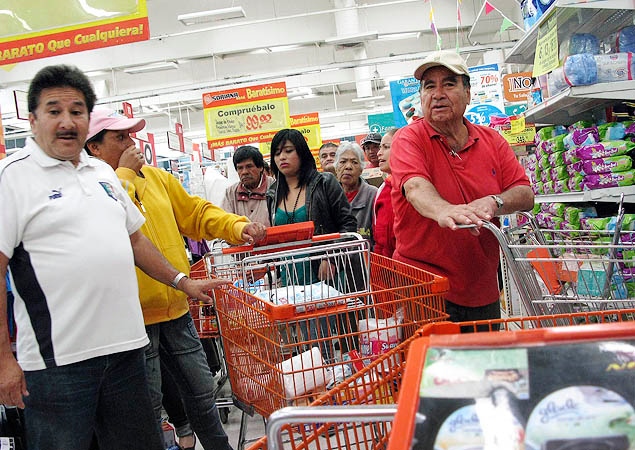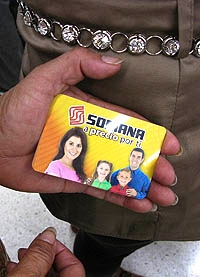Throngs in Mexico hit stores with gift cards they say came from election-winning PRI
Talk of vote-buying heats up, and shoppers complain they were shortchanged 'for helping them with votes and all' when supposed 500 peso cards turn out to be worth only 100 pesos
By The Associated Press
Tuesday, July 3, 2012

Marco Ugarte/AP
Shoppers wait in line at jammed supermarket in Mexico City on Tuesday.
MEXICO CITY — Thousands of people rushed to stores on Tuesday to redeem prepaid gift cards they said were given them by the party that won Mexico’s presidency, inflaming accusations that the election was marred by massive vote-buying.
At least a few cardholders were angry, complaining they didn’t get as much as promised. Neighbors at one store in a poor neighborhood on the outskirts of Mexico City said the unusually large crowds had prevented them from doing their daily shopping.
Some of those lined up to use their gift cards said they got them for supporting the Institutional Revolutionary Party, or PRI, whose candidate Enrique Pena Nieto won Sunday’s election. Some wore red T-shirts and baseball caps with Pena Nieto’s name printed in white.
Maria Salazar, a 20-year-old university student, came with her 70-year-old father, Antonio Salazar, to cash three gift cards.

Marco Ugarte/AP
Prepaid gift card that holders said came from PRI, the party that won Mexico's presidency in Sunday's election.
“They gave us the cards in the name of the PRI and Rep. Hector Pedroza
(a PRI congressional candidate), and they said they were counting on our
vote,” Maria Salazar said outside the store, as she carried plastic
shopping bags packed with toilet paper, cooking oil, rice, saltine
crackers and instant noodle soups.
Her father carried another two packed grocery bags and her 8-year-old
nephew carried another.
“They told us they were worth 500 pesos ($37.50), but when we got to the
checkout, they were only worth 100 rotten pesos, ($7.50)” Salazar said.
Both she and her father said they had been told to turn in a photocopy of their voter ID card in order to get the gift cards.
Another woman interviewed outside the same Soriana grocery store also complained her card had only 100 pesos ($7.50) in credit.
“For helping them with votes and all ... they gave us a card for supporting them, and all that for 100 pesos,” said the woman, who gave only her first name, Josefina, for fear of reprisals. She said she got the card for supporting Pena Nieto, but complained that “100 pesos lasts you about five minutes.”
Inside the store, such long lines formed at card-reading machines as people tried to find the balances on their cards. Some grew angry and shouted insults against Pena Nieto.
Regular shoppers were vexed at the long lines. “I was going to buy bread right now, but you can see, the lines are tremendous, you can’t even get in,” said Maria Garcia Lobato.
Pena Nieto’s campaign and the PRI press office said they had no immediate comment, and the press representative of the Soriana grocery store chain did not immediately respond to phone calls. In the final days of the campaign, PRI officials denied similar allegations that the party distributed pre-paid cash cards from a local bank.
On the Friday before the vote, the leftist Democratic Revolution Party — whose candidate Andres Manuel Lopez Obrador came in second — issued a statement accompanied by photos of dozens of the Soriana cards, saying they had been distributed by a PRI-affiliated union, and it filed a complaint to electoral authorities.
Under Mexican election law, giving voters gifts is not a crime unless the gift is meant to condition or influence their votes. Also, the cost of such gifts must be reported to authorities, and cannot exceed campaign spending limits. Violations of those rules are usually punished with fines, but are not usually considered ground for annulling the elections.
On Tuesday, Alfredo Figueroa, a council member of the oversight agency known as the Federal Electoral Institute, said authorities are investigating the Soriana card complaint. Members of the institute have said they were aware of attempts to engage in vote buying.
Figueroa also said that irregularities in vote tallies may eventually lead to the opening and recounting of votes from as many as 50,000 polling stations, about one-third of the 143,000 involved in Sunday’s vote.
But on Tuesday, Lopez Obrador said his team had detected irregularities in 113,855 polling places, and called for a much wider recount. “This is a scandal ... They bought millions of votes,” Lopez Obrador said, referring to the PRI. “Clearly, they far exceeded campaign spending limits ... this is a national embarrassment,” he told a news conference.
© Copyright 2012 NYDailyNews.com. All rights reserved. http://www.nydailynews.com